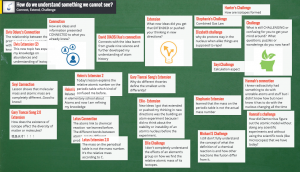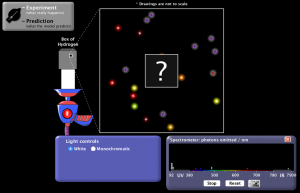Everything comes down to time. Since the last face 2 face this has been made more clear to me than ever before – time to plan, time to mark, time to write reports and…always at the bottom of the list…time to breathe (not to mention, write a blog – oops!)
While the never-ending list is common to all teachers and an annual source of stress at those reoccurring ‘crunch times,’ I have been increasingly cognizant of how much more I want to make the way I spend my time in and out of class result in something meaningful for my students.
With the focus of my research question revolving around achieving deeper thinking and collaborative learning, I experimented with using essential questions as the foundation for the unit I’ve just completed teaching. Though when introduced the students responded with “Awww….this is gonna be like TOK (Theory of Knowledge), isn’t it?” I found coming back to a fundamental and multifaceted question really grounded the unit and elicited thinking beyond the immediate context of the lesson. To encourage refection around the essential question, I also had students complete a “Connect, Extend and Challenge” thinking activity at the end of most lessons. This made thinking visible using Padlet (thanks @aianovskaia for the suggestion) and allowed students to monitor how their own thoughts and the thoughts of their classmates changed and developed with new knowledge.
In a unit revolving around atomic structure, our essential question of “How do we understand something we cannot see?” really tied into practical experiments – even for a unit in chemistry that is traditionally dry and very theory-based. It was great to consider how scientists could have come up with such ground-breaking new ideas simply from observing and finding new ways to explain experimental results. A highlight for me was having groups of students use an online simulation to ‘see’ the results of Bohr’s experiment and try to apply their learning to explain what was going on!
While I feel that the learning that took place in this unit went some way toward meeting my goal of ‘deeper and collaborative learning,’ the sacrifice has been time. Because we spent more time on discovering new ideas, extending fundamental facts to applications and building an understanding together (without lessons being teacher-led or ‘spoon-fed’) I am now behind in terms of course content. Unfortunately, in an IB course where the end-game is an external exam, it is vital that the students complete all core content in a given time.
So back to my conundrum. How do I achieve deeper, collaborative and student-driven learning while adhering to an externally imposed timeline? I am still working on this balance and optimistic that it can be achieved. For the time being, I strongly believe that the extra time we took over this unit will be regained. As the students build skills in critical thinking and their ability to acquire knowledge, subsequent units (regardless of complexity and volume of content) should become more manageable because the students are discovering, for themselves, how they learn best and most efficiently.


Hi Heather,
Great post. I love how you are having your students think about thinking. You are not alone in your conundrum. I think that we all struggle to cover the required content in the given time, especially when we want to get away from “chalk and talk” and provide opportunities for our students to grapple with big ideas rather than just memorize information. I can only imagine how much more intense this must be in the IB program!
Have you considered flipping some of your lessons, so that students can watch videos that cover more content at home, and then class time for the big thinking? Check out the work that @mrathier did in her Chemistry classroom last year: http://cohort21.com/melissarathier/2015/01/07/flipped-classroom-2-0/ Also, a couple year ago @jdenison also explored flipping the classroom and has some great resources in this blog post: http://cohort21.com/jdenison/2013/04/20/my-cohort-21-experience-and-flipped-teaching/
Happy Holidays!
– Les
Heather – What a wonderful reflection! I know @maragona feels the exact same way as she struggles with the tension of creating a rich/engaging IB Chem class while at the same time meeting the content coverage requirements of the IB diploma exams. I think you have found a nice balance here and would suggest that looming feeling that your are not covering the “content” is never going to go away but is a opportunity to ask “how might I cover this in a different way?”. @shelleythomas also runs the IB Diploma over a Ridley. She might be able to put you in touch with some other IB teachers struggling with the same thing. First season Cohort member @iamritapak migtht be able to chime in as well. She and Marie struggle with this all the time. A struggle well worth exploring!
J
@gnichols@ddoucet
HI Heather, While the investment in time seems like a sacrifice at the moment, I agree with you that in the long run it will benefit your students. I believe your approach of teaching the unit through essential questions allows the students to hang their learning on a bigger framework so that when presented with new material they are better equipped to handle it. Your particular essential question related to the use of models is so applicable to other disciplines that I am sure that not only will this help them in your chemistry class but in their other classes as well. I think teachers feel so much pressure to cover the content in externally assessed courses (like IB) that they are afraid to try something new. I commend you on taking the risk by exploring a new approach and using new technology in your IB chemistry class. Your enthusiasm is contagious and you have inspired me to look at my own classroom differently. Thank you.
Heather – this is an age-old problem and one where there is no perfect answer. I think we would all agree that your students benefit the most from the deeper collaborative learning style you have used, even at the cost of giving up the precious time needed to cover the IB curriculum. As a veteran educator I can only suggest that you marry the two the best you can; don’t stop the creative approach when exploring the needed concepts and continue to search for more efficient ways to cover the curriculum expectations (i.e. flipped classroom model?). Good luck with this conundrum; you are not alone searching for a workable solution.